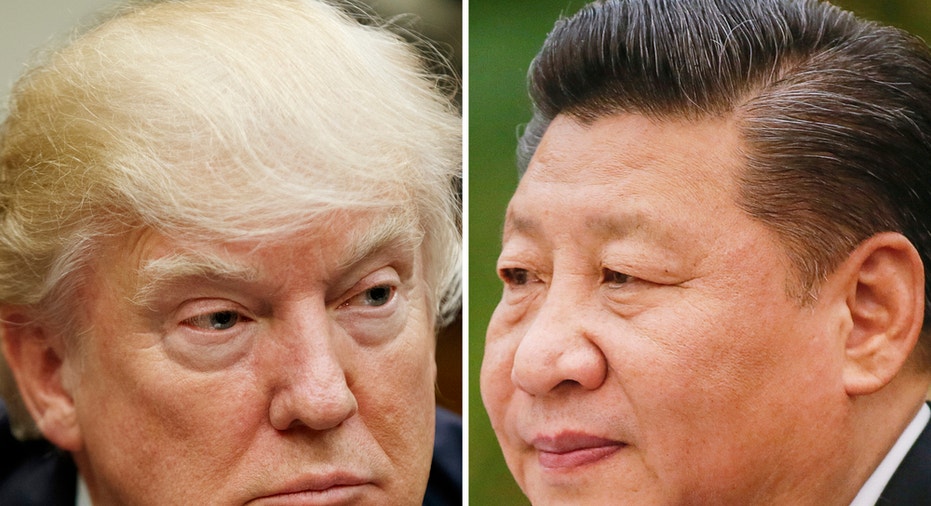U.S.-China Trade Tensions Loom Over Trump-Xi Summit

As President Donald Trump and China's President Xi Jinping meet this week for what White House officials are calling an introductory summit, there is one issue where the U.S. leader's position will need no introduction: trade.
Mr. Trump won the White House in part with an angry denunciation of other countries' economic "cheating," using China as Exhibit One. Last week, he predicted a "very difficult" meeting with Mr. Xi, citing "massive trade deficits and job losses."
Even with North Korea and other Asian security concerns on the horizon, disagreements over trade between the world's two largest economies may well be the topic that brings the most tension to the gathering at Mr. Trump's Mar-a-Lago club in Florida on Thursday and Friday. White House officials aren't setting expectations for any kind of grand deal.
"At the end of the meeting it's essentially going to be a stalemate -- agree to disagree on a lot of things," said Scott Kennedy, a China scholar at the Center for Strategic and International Studies, a think tank.
The visit will set the tone for a complex relationship, one Mr. Trump aims to redefine by combating what he and his trade advisers see as the dumping of products in the U.S. at below fair value and Beijing's broad policies of subsidizing industries from metals production to aviation at the expense of American competitors.
Some business leaders said they would like Mr. Trump to convey his concerns about China's business climate -- including limits on investment and fights over technology and intellectual property -- so that the countries can work together over the long term on resolving the issues rather than merely blocking each other's exports.
"While we don't yet know the strategy of the Trump administration, we do agree with its desire for signification changes to Chinese policies that will result in a more market-based and level playing field for American companies," said Jeremie Waterman, the China director at the U.S. Chamber of Commerce, the biggest U.S. business lobby.
A senior White House official told reporters on Tuesday that Mr. Trump intends to work in a constructive manner to reduce trade and investment barriers in China. The topics haven't been decided on in advance, so the two leaders are set to bring up whatever is on their minds, with the aim of starting a framework for addressing disagreements rather than setting policy on tariffs or other areas, the official said.
Progress with China has slowed recently, and the Trump administration wants to make the relationship more "fair, balanced and based on the principle of reciprocity," the official said.
Adding to the uncertainty is the fact that the meeting is happening quite early in Mr. Trump's term. His pick for U.S. trade representative, Robert Lighthizer, hasn't been confirmed by the Senate, and the Trump team hasn't brought key officials on board to develop a detailed strategy for challenging China's trade practices.
Moreover, members of his trade team hold disparate views on the issue. Some are closer to the traditional free-trade approach and others are pushing a harder line against Beijing to lower the trade deficit in goods with China, which stood at $347 billion in 2016. China's ambassador has courted Trump adviser and son-in-law Jared Kushner, part of the former group, in an effort to lower tensions.
Some diplomats and experts on Beijing said Mr. Xi may seek to further calm the waters by offering to limit certain Chinese exports, announcing deals for Beijing's state-run companies to buy big-ticket American exports, or arranging to make large Chinese investments in the U.S.
"I bet you dollars to doughnuts that Xi is coming bearing a specific gift like that that Trump will tweet," said Max Baucus, the U.S. ambassador to Beijing at the end of Barack Obama's presidency and a longtime Democratic senator overseeing trade issues.
But lawmakers and some business lobbyists in Washington are growing increasingly worried that limited deals with Beijing aren't tackling the big economic and business disputes between the two countries.
Mr. Obama went to considerable effort to strike a major climate deal with Mr. Xi, for example, but Beijing was able to gain commercial advantage of that deal through massive state-driven investment in solar and wind technology, Mr. Baucus said.
Some top officials in the Trump administration said China hasn't abided by previous trade commitments, so they are planning to press ahead with plans to bring major unilateral trade-enforcement cases that could hit Chinese industries with big tariffs.
"Eventually the Trump administration will use a series of carrots and -- mostly -- sticks to try to get China to modify its economic policies, and I think China will respond in kind," said CSIS's Mr. Kennedy.
Launching trade-enforcement cases under U.S. law could bring retaliation against American products directly from China or through the World Trade Organization, trade lawyers say. The Obama administration mostly avoided unilateral trade-enforcement actions under U.S. law, instead favoring a series of WTO cases against Beijing that often take years to produce a result for a given industry.
Given Mr. Trump's style and his recent meetings with world leaders, former officials and trade experts see a risk that the new president could make a public remark or Twitter post that strains the relationship. Starting off on the wrong foot could have repercussions both in trade and the security sphere.
On the other hand, Mr. Trump's experience in complicated business negotiations could be an asset, said Ed Mermelstein, a longtime Manhattan real estate lawyer who has worked with Mr. Trump.
"If you've ever done a major real estate transaction in New York, there's no other way of describing it than war," Mr. Mermelstein said, adding that "there's often a peace treaty signed at the end."



















